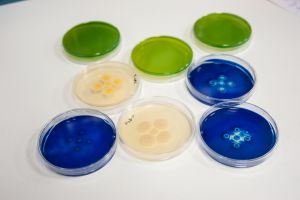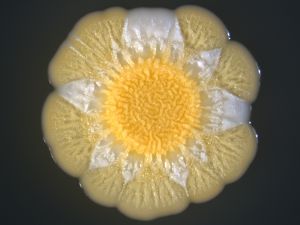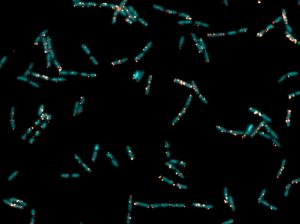- Dos grupos del CNB entre los nuevos proyectos de investigación financiados en la sexta edición de la convocatoria CaixaResearch de Investigación en Salud, promovida por la Fundación ”la Caixa”
- La convocatoria apoya proyectos de investigación básica, clínica o traslacional de excelencia científica y de impacto social en los ámbitos de estudio de las enfermedades cardiovasculares y las infecciosas, en oncología y en neurociencias, así como proyectos que desarrollan tecnologías facilitadoras en estos ámbitos.
La Fundación ”la Caixa” ha celebrado en Barcelona el acto de entrega de ayudas a los 33 proyectos de investigación en biomedicina y salud que se llevarán a cabo en centros de España y Portugal. Se trata de proyectos seleccionados en el marco de la convocatoria CaixaResearch de Investigación en Salud 2023, que tiene el objetivo de impulsar la investigación biomédica de excelencia con gran impacto social en investigación básica, clínica y traslacional. Los grupos de Daniel López Serrano y José María Valpuesta se encuentran entre los seleccionados para desarrollar estos proyectos.
En la ceremonia, que ha tenido lugar en el Museo de la Ciencia CosmoCaixa, el director general de la Fundación ”la Caixa”, Antonio Vila Bertrán, ha recordado: «La investigación científica es fundamental para el progreso social y el bienestar de los ciudadanos. La ciencia no solo nos ayuda a construir la sociedad del conocimiento, sino que es clave para mejorar la calidad de vida de aquellos que más lo necesitan».
La convocatoria, a la que este año se habían presentado 493 propuestas, está especialmente dirigida al abordaje de retos de salud, como las enfermedades infecciosas (ámbito sobre el que se han elegido 8 proyectos), las neurociencias (7), las enfermedades cardiovasculares y metabólicas relacionadas (7) y la oncología (6). Además, otras 5 iniciativas premiadas desarrollarán tecnologías facilitadoras en alguno de estos campos.
Cell 2017 Nov 02; doi: http://dx.doi.org/10.1016/j.cell.2017.10.012
Esther García-Fernández, Gudrun Koch, Rabea M. Wagner, Agnes Fekete, Stephanie T. Stenge, Johannes Schneider, Benjamin Mielich-Süss, Sebastian Geibel, Sebastian M. Markert, Christian Stigloher, Daniel López.
The European Commission recently granted eight million euros to develop a project called Rafts4Biotech, coordinated by Daniel López from the Centro Nacional de Biotecnología of the CSIC (CNB-CSIC). The project involves 12 institutions from all over the continent that seek to exploit the lipid rafts in synthetic bacteria to optimise processes of interest to the pharmaceutical, cosmetic and food industries.
COOKIES POLICY
A cookie is a text file that is stored on your computer or mobile device via a web server and only that server will be able to retrieve or read the contents of the cookie and allow the Web site remember browser preferences and navigate efficiently. Cookies make the interaction between the user and the website faster and easier.
General information
This Website uses cookies. Cookies are small text files generated by the web pages you visit, which contain the session data that can be useful later in the website. In this way this Web remembers information about your visit, which can facilitate your next visit and make the website more useful.
How do cookies?
Cookies can only store text, usually always anonymous and encrypted. No personal information is ever stored in a cookie, or can be associated with identified or identifiable person.
The data allow this website to keep your information between the pages, and also to discuss how to interact with the website. Cookies are safe because they can only store information that is put there by the browser, which is information the user entered in the browser or included in the page request. You can not run the code and can not be used to access your computer. If a website encrypts cookie data, only the website can read the information.
What types of cookies used?
The cookies used by this website can be distinguished by the following criteria:
1. Types of cookies as the entity that manages:
Depending on who the entity operating the computer or domain where cookies are sent and treat the data obtained, we can distinguish:
- Own cookies: are those that are sent to the user's terminal equipment from a computer or domain managed by the editor itself and from which provides the service requested by the user.
- Third party cookies: these are those that are sent to the user's terminal equipment from a machine or domain that is not managed by the publisher, but by another entity data is obtained through cookies.
In the event that the cookies are installed from a computer or domain managed by the editor itself but the information collected by these is managed by a third party can not be considered as party cookies.
2. Types of cookies as the length of time that remain active:
Depending on the length of time that remain active in the terminal equipment can be distinguished:
- Session cookies: cookies are a type designed to collect and store data while the user accesses a web page. Are usually used to store information that only worth preserving for the service requested by the user at any one time (eg a list of products purchased).
- Persistent cookies: cookies are a type of data which are stored in the terminal and can be accessed and treated for a period defined by the head of the cookie, and can range from a few minutes to several years.
3. Cookies types according to their purpose:
Depending on the purpose for which the data are processed through cookies, we can distinguish between:
- Technical cookies: these are those that allow the user to navigate through a web page or application platform and the use of different options or services it exist as, for example, control traffic and data communication, identify the session, access to restricted access parts, remember the elements of an order, make the buying process an order, make an application for registration or participation in an event, use security features while browsing store content for dissemination videos or sound or share content via social networks.
- Customization cookies: these are those that allow the user to access the service with some general characteristics based on a predefined set of criteria in the user terminal would eg language, the type of browser through which you access the service, the locale from which you access the service, etc.
- Analysis cookies: they are those that allow the responsible for them, monitoring and analyzing the behavior of users of the web sites that are linked. The information gathered through such cookies are used in measuring the activity of web sites, application or platform and for the profiling of user navigation of such sites, applications and platforms, in order to make improvements function data analysis how users use the service.
Management tool cookies
This Website uses Google Analytics.
Google Analytics is a free tool from Google that primarily allows website owners know how users interact with your website. Also, enable cookies in the domain of the site in which you are and uses a set of cookies called "__utma" and "__utmz" to collect information anonymously and reporting of website trends without identifying individual users..
For statistics of use of this website use cookies in order to know the level of recurrence of our visitors and more interesting content. This way we can concentrate our efforts on improving the most visited areas and make the user more easily find what they are looking for. On this site you can use the information from your visit for statistical evaluations and calculations anonymous data and to ensure the continuity of service or to make improvements to their websites. For more details, see the link below privacy policy [http://www.google.com/intl/en/policies/privacy/]
How to manage cookies on your computer: disabling and deleting cookies
All Internet browsers allow you to limit the behavior of a cookie or disable cookies within settings or browser settings. The steps for doing so are different for each browser, you can find instructions in the help menu of your browser.
If you decline the use of cookies, since it is possible thanks to the preferences menu of your browser or settings, reject, this website will continue to function properly without the use of the same.
Can you allow, block or delete cookies installed on your computer by setting your browser options installed on your computer:
- For more information about Internet Explorer click here.
- For more information on Chrome click here.
- For more information about Safari click here.
- For more information about Firefox click here.
Through your browser, you can also view the cookies that are on your computer, and delete them as you see fit. Cookies are text files, you can open and read the contents. The data within them is almost always encrypted with a numeric key corresponding to an Internet session so often has no meaning beyond the website who wrote it.
Informed consent
The use of this website on the other hand, implies that you paid your specific consent to the use of cookies, on the terms and conditions provided in this Cookies Policy, without prejudice to the measures of deactivation and removal of cookies that you can take, and mentioned in the previous section.









